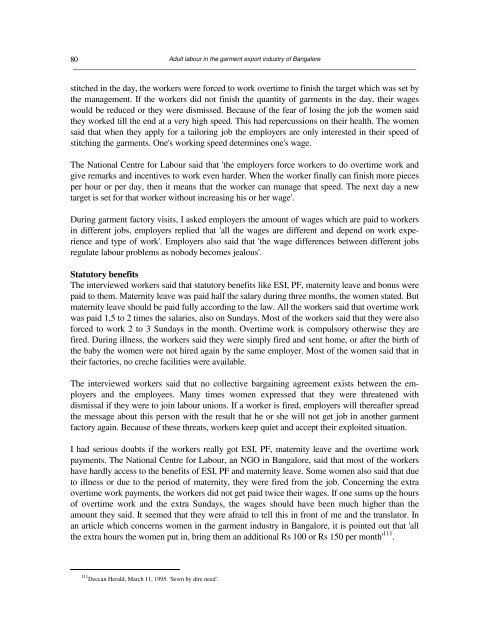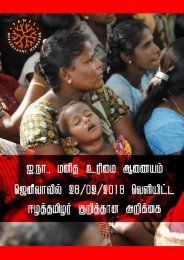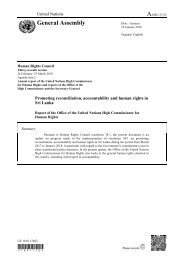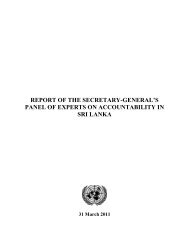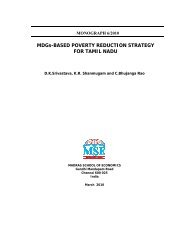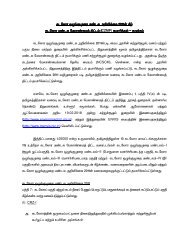Create successful ePaper yourself
Turn your PDF publications into a flip-book with our unique Google optimized e-Paper software.
80<br />
Adult <strong>labour</strong> <strong>in</strong> <strong>the</strong> <strong>garment</strong> <strong>export</strong> <strong>in</strong>dustry <strong>of</strong> Bangalore<br />
──────────────────────────────────────────────────────────────────────────────────────────────<br />
stitched <strong>in</strong> <strong>the</strong> day, <strong>the</strong> workers were forced to work overtime to f<strong>in</strong>ish <strong>the</strong> target which was set by<br />
<strong>the</strong> mana<strong>gem</strong>ent. If <strong>the</strong> workers did not f<strong>in</strong>ish <strong>the</strong> quantity <strong>of</strong> <strong>garment</strong>s <strong>in</strong> <strong>the</strong> day, <strong>the</strong>ir wages<br />
would be reduced or <strong>the</strong>y were dismissed. Because <strong>of</strong> <strong>the</strong> fear <strong>of</strong> los<strong>in</strong>g <strong>the</strong> job <strong>the</strong> women said<br />
<strong>the</strong>y worked till <strong>the</strong> end at a very high speed. This had repercussions on <strong>the</strong>ir health. The women<br />
said that when <strong>the</strong>y apply for a tailor<strong>in</strong>g job <strong>the</strong> employers are only <strong>in</strong>terested <strong>in</strong> <strong>the</strong>ir speed <strong>of</strong><br />
stitch<strong>in</strong>g <strong>the</strong> <strong>garment</strong>s. One's work<strong>in</strong>g speed determ<strong>in</strong>es one's wage.<br />
The National Centre for Labour said that '<strong>the</strong> employers force workers to do overtime work <strong>and</strong><br />
give remarks <strong>and</strong> <strong>in</strong>centives to work even harder. When <strong>the</strong> worker f<strong>in</strong>ally can f<strong>in</strong>ish more pieces<br />
per hour or per day, <strong>the</strong>n it means that <strong>the</strong> worker can manage that speed. The next day a new<br />
target is set for that worker without <strong>in</strong>creas<strong>in</strong>g his or her wage'.<br />
Dur<strong>in</strong>g <strong>garment</strong> factory visits, I asked employers <strong>the</strong> amount <strong>of</strong> wages which are paid to workers<br />
<strong>in</strong> different jobs, employers replied that 'all <strong>the</strong> wages are different <strong>and</strong> depend on work experience<br />
<strong>and</strong> type <strong>of</strong> work'. Employers also said that '<strong>the</strong> wage differences between different jobs<br />
regulate <strong>labour</strong> problems as nobody becomes jealous'.<br />
Statutory benefits<br />
The <strong>in</strong>terviewed workers said that statutory benefits like ESI, PF, maternity leave <strong>and</strong> bonus were<br />
paid to <strong>the</strong>m. Maternity leave was paid half <strong>the</strong> salary dur<strong>in</strong>g three months, <strong>the</strong> women stated. But<br />
maternity leave should be paid fully accord<strong>in</strong>g to <strong>the</strong> law. All <strong>the</strong> workers said that overtime work<br />
was paid 1,5 to 2 times <strong>the</strong> salaries, also on Sundays. Most <strong>of</strong> <strong>the</strong> workers said that <strong>the</strong>y were also<br />
forced to work 2 to 3 Sundays <strong>in</strong> <strong>the</strong> month. Overtime work is compulsory o<strong>the</strong>rwise <strong>the</strong>y are<br />
fired. Dur<strong>in</strong>g illness, <strong>the</strong> workers said <strong>the</strong>y were simply fired <strong>and</strong> sent home, or after <strong>the</strong> birth <strong>of</strong><br />
<strong>the</strong> baby <strong>the</strong> women were not hired aga<strong>in</strong> by <strong>the</strong> same employer. Most <strong>of</strong> <strong>the</strong> women said that <strong>in</strong><br />
<strong>the</strong>ir factories, no creche facilities were available.<br />
The <strong>in</strong>terviewed workers said that no collective barga<strong>in</strong><strong>in</strong>g agreement exists between <strong>the</strong> employers<br />
<strong>and</strong> <strong>the</strong> employees. Many times women expressed that <strong>the</strong>y were threatened with<br />
dismissal if <strong>the</strong>y were to jo<strong>in</strong> <strong>labour</strong> unions. If a worker is fired, employers will <strong>the</strong>reafter spread<br />
<strong>the</strong> message about this person with <strong>the</strong> result that he or she will not get job <strong>in</strong> ano<strong>the</strong>r <strong>garment</strong><br />
factory aga<strong>in</strong>. Because <strong>of</strong> <strong>the</strong>se threats, workers keep quiet <strong>and</strong> accept <strong>the</strong>ir exploited situation.<br />
I had serious doubts if <strong>the</strong> workers really got ESI, PF, maternity leave <strong>and</strong> <strong>the</strong> overtime work<br />
payments. The National Centre for Labour, an NGO <strong>in</strong> Bangalore, said that most <strong>of</strong> <strong>the</strong> workers<br />
have hardly access to <strong>the</strong> benefits <strong>of</strong> ESI, PF <strong>and</strong> maternity leave. Some women also said that due<br />
to illness or due to <strong>the</strong> period <strong>of</strong> maternity, <strong>the</strong>y were fired from <strong>the</strong> job. Concern<strong>in</strong>g <strong>the</strong> extra<br />
overtime work payments, <strong>the</strong> workers did not get paid twice <strong>the</strong>ir wages. If one sums up <strong>the</strong> hours<br />
<strong>of</strong> overtime work <strong>and</strong> <strong>the</strong> extra Sundays, <strong>the</strong> wages should have been much higher than <strong>the</strong><br />
amount <strong>the</strong>y said. It seemed that <strong>the</strong>y were afraid to tell this <strong>in</strong> front <strong>of</strong> me <strong>and</strong> <strong>the</strong> translator. In<br />
an article which concerns women <strong>in</strong> <strong>the</strong> <strong>garment</strong> <strong>in</strong>dustry <strong>in</strong> Bangalore, it is po<strong>in</strong>ted out that 'all<br />
<strong>the</strong> extra hours <strong>the</strong> women put <strong>in</strong>, br<strong>in</strong>g <strong>the</strong>m an additional Rs 100 or Rs 150 per month' 111 .<br />
111 Deccan Herald, March 11, 1995. 'Sewn by dire need'.


